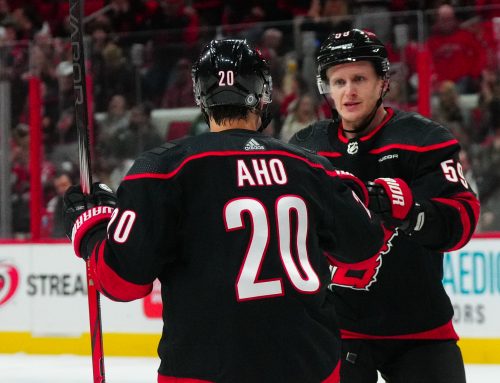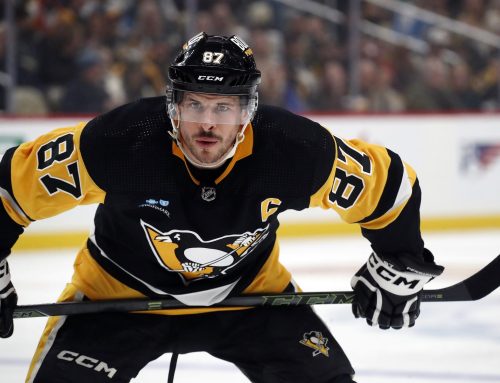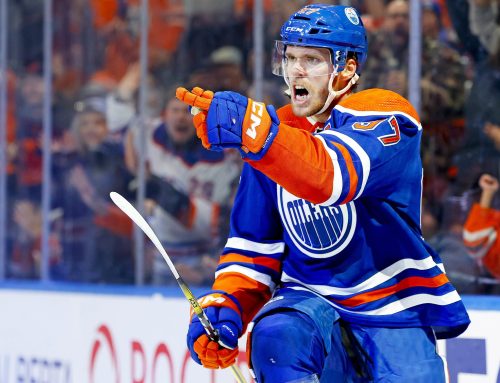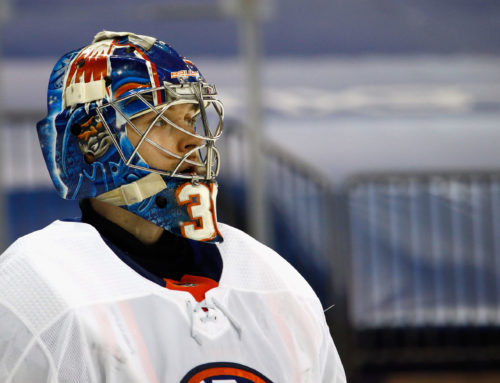Top 10 Fantasy Hockey Lessons Learned This Year
Tom Collins
2021-06-21
They say you're never too old to learn, and that holds in fantasy hockey as well.
Fantasy general managers who are still clinging to the old ways will find themselves struggling each season but will chalk up the lack of success to luck. These are the GMs who consistently draft over-the-hill players believing they are still as good as when they were in their prime. These GMs overrate players that have never had success in the NHL. These GMs still draft players based on who the players line up with (two years ago, a buddy of mine who is a Leafs fan drafted Cody Ceci in a points-only pool because Ceci was going to play alongside Morgan Rielly).
Of course, those fantasy GMs are never successful as they choose not to learn from how fantasy hockey has changed over the years.
Below are 10 lessons one can learn from this fantasy season. Some will be repeat lessons for fantasy GMs who have been involved in fantasy hockey for years and have chosen to adapt how they view fantasy hockey. Those newer to the fantasy game may have learned some of the lessons the hard way.
10. Don't overrate one big season
Oftentimes, a fantasy general manager will see a player have a huge surprising campaign, and then overreach for that player in drafts the next season. Some of the top surprises in 2019-20 included Tony DeAngelo, Bryan Rust, Travis Konecny, Mika Zibanejad and J.T. Miller. They all took a step back this season for various reasons. Not every player will step back, but the ones who continue to build on their surprising season are in the minority. Keep this in mind next season when debating when to draft Mackenzie Weegar, Kevin Lankinen, Carter Verhaeghe and Mike Smith.
9. Be wary of using any stat referring to per 60 minutes
I know people who trust per 60 minutes to show why a certain player is much better than his statistics indicate, but I'm always wary of those numbers. If the player could be more productive, then why isn't the coach giving that player more ice time? And if the coach won't give the player more ice time, then how can the player become more productive? Sure, maybe Jakub Vrana's points-per-60 indicates he should be given more ice time, but you could argue the same thing about Jason Spezza, Marcus Foligno and Daniel Sprong (all among the top 25 in points/60). The top 10 in goals/60 (minimum 20 games) were Auston Matthews, Sprong, Vrana, Ross Colton, Brendan Gallagher, Brandon Saad, Joel Farabee, Michael Bunting, Mikko Rantanen and Joel Eriksson Ek. I'd much rather use per-game numbers. It's better to say a player is averaging 2.1 shots per game rather than eight shots per 60 minutes,
8. Don't overrate rookies
This lesson is for one-year pools. Keeper leagues and dynasties certainly need to draft youth and be patient with the young players. It's not surprising that many rookies fail, and that the ones that succeed may not be the ones you expect. Alexis Lafreniere was supposed to be the biggest can't miss #1 pick since Connor McDavid, but he faltered with 21 points in 56 games. The top rookie defenseman in the preseason was Bowen Byram, but he played only 19 games and had just two points. Just for fun, go back and look at the Calder odds from last December (here's another one that tracked Calder odds throughout the season). Kirill Kaprizov is the only one who produced. Some of the top rookies this year included Alex Nedeljkovic, Jason Robertson, Josh Norris, Yegor Sharangovich, Pius Suter and Vitek Vanecek. All these freshmen were available on the waiver wire at the start of the season. Don't worry about grabbing one at the draft.
7. Don't rely on linemates of top players
In the old days, deciding on a sleeper pick was as easy as drafting the player playing alongside the elite. Unfortunately, that doesn't work as well as it used to. Coaches are too likely to change the lineup shift to shift. Plus, it seems as if those linemates that should be getting a bump aren't. Gone are the days when Warren Young scored 40 goals alongside Mario Lemieux, or when Sidney Crosby carried Chris Kunitz to the Olympics. Connor McDavid couldn't turn Jesse Puljujarvi into a 40-point player and Jack Eichel couldn't elevate Taylor Hall or Sam Reinhart. There's a reason Colorado and Boston prefer to load up on one line instead of spreading out the offense to try to kickstart other players.
6. At some point, a player will never become as good as you hoped
Fantasy general managers are both the most patient and impatient people imaginable. That may seem contradictory, but both can be true at the same time. In one-year leagues, fantasy GMs can freak out and panic after a rough start to the season, dropping top players for those who are off to unsustainable hot starts. In keeper pools, fantasy general managers will hold on to a player for years waiting for a breakout season that will never come. At some point, you have to value the player for what he is and not what he might do. Matt Duchene used to the best example of how many believed he was a point-per-game player, but now everyone values him properly. Sam Reinhart is probably the best recent example. If he can't break 70 points with plum power-play time and top-line minutes while playing alongside Jack Eichel, then it's time to start treating him like a 60-point player. Colton Parayko is another recent example. Eventually, you have to accept the fact that the player you've been hoarding will never be better than what he is now.
5. You know nothing about goalies . . .
One of the more common mistakes rookie fantasy general managers make is how high they select a goalie. With one exception (more on him in a minute), goalies are a crapshoot. You use a high pick on a netminder just to watch them struggle. Think of last season. The top 10 goalies drafted, on average, included Carter Hart, Tuukka Rask, Robin Lehner, Jordan Binnington, Ilya Samsonov, Carey Price, Frederik Andersen and Igor Shesterkin. They were all disappointments. Meanwhile, Mike Smith, Philipp Grubauer, Marc-Andre Fleury and Vitek Vanecek were some of the top netminders in fantasy and were available much later.
4. Except for Andrei Vasilevskiy
When drafting a netminder, you're looking for two things: An elite goalie or one that plays on a top team. With Vasilevskiy, he's both. That is going to lead to a lot of wins. Vas is the only sure thing when it comes to NHL goalkeepers. Unless he gets injured, he will be near the top of the NHL leaderboard for wins. One additional bonus is that Tampa Bay leans heavily on their top goalkeeper and doesn't have a backup that will steal starts.
3. It's a young man's game on offense.
It used to be that a forward was considered in his prime between the ages of 25-32. That is no longer the case. This season, six of the top 10 point producers were 25 years and younger. Those six were Connor McDavid, Leon Draisaitl, Mitch Marner, Auston Matthews, Mikko Rantanen and Nathan MacKinnon. If you extend it to the top 20 players, you add Aleksander Barkov, Sebastian Aho and Alex DeBrincat to that list. In total, 20 of the top 50 point-getters this season were on the young side.
2. It's also a young man's game on defense
Teams are more likely to let their young guns shine on defense as well. This is probably the biggest shift in the last few years. Instead of going with the greybeards, teams are turning the power-play unit over to young guys. Six of the top 12 defensemen in points were under the age of 25. Expand it to the top 30 for defensemen, and you'll find 12 defensemen under the age of 25 (plus three 26-year-olds).
1. Do not overthink things if you have the No.1 pick
You could see a debate a few years ago about who to take if you had the first overall pick in a fantasy draft. Nikita Kucherov is a dynamite player who put up 128 points a couple of seasons ago. Nathan MacKinnon is awesome and averages about 4.5 shots per game. Alexander Ovechkin has won an estimated 58 Rocket Richard trophies and will pile up the shots and hits. However, there should be no doubt about the number one pick after the season Connor McDavid just had. He was on pace for 154 points over 82 games and his points-per-game mark has gone up every season. There's been much talk about how McDavid was fortunate to play just against the North division, but imagine what happens when he starts getting games against the Sabres, Red Wings, Sharks and struggling goalies such as Carter Hart. Only two players (Mario Lemieux and Wayne Gretzky) have ever had 160 points in a season, and the last time was in 1992-93. McDavid has a realistic chance of becoming the third player next season.





 TOR
TOR BOS
BOS DAL
DAL VGK
VGK EDM
EDM L.A
L.A COL
COL FLA
FLA T.B
T.B VAN
VAN WPG
WPG NYR
NYR S.J
S.J
